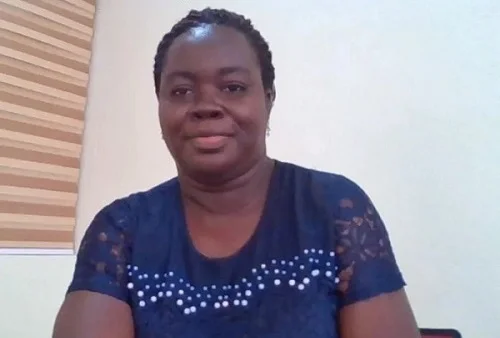Hot!
Unhappy MTN customers besiege office

Some upset customers whose SIM cards and Momo accounts have been blocked since Thursday besiege the MTN office at Darkumam Junction in Accra.
They said they could not access any of the services of MTN and were worried.
This comes after Mrs Ursula Owusu-Ekuful, Minister of Communications, announced that all unregistered SIM cards will be deactivated by November 30, 2022.
A total of 18.9 million (18,930,664) SIM Cards have been fully registered as of October 4, 2022, in accordance with the SIM Registration directives and the process, which commenced on October 1, 2021.
Some customers failed to meet the deadline, which was extended twice.
At 9 am when the Ghana News Agency (GNA) visited the MTN office, it was crowded with customers demanding for it to be opened to them by the workers who had locked themselves in since they arrived to work.
A customer, who pleaded anonymity, alleged that some of the customers had been at the office as early as 1 am hours in the morning but the workers walked past them and entered the office.
She said some of the workers came out later and asked them to form a queue so they could attend to them but the customers refused because they suspected mischief.
“If it was not for mischief they would have opened the office before 9 am but it is over 10 am and they have not opened the office,” she said.
Another young customer said some of the workers who had come out today told them that nothing could be done about the blocked SiMs at that moment.
A police officer, who the GNA learned was detailed there, tried to control the crowd until another one who said he was from the headquarters when he addressed the crowd, arrived.
One of the workers came out to talk to the customers and assured them that they would attend to those who wanted to obtain new SIM cards but issues of blocked SIMs would be dealt with on Monday, December 5, because the network was poor.
After the announcement, the policemen ensured that the customers were in a queue to be attended to.
SIM card registration is part of measures to reduce SIM-related fraud in the country. -GNA
Hot!
Swedru All Blacks back to winning ways, Roshan humble King Faisal

Sekondi Rospak FC made it eight wins in eight successive home games after three second-half goals from John Amoah, Joseph Ntow and Stephen Anthony Kofi. John Amoah opened the scoring in the 55th minute after a barren first half. Joseph Ntow added to the tally in the 56th minute before Stephen Anthony Kofi rounded things up in the 74th minute to give Rospak a 3-0 win over former Premier League side King Faisal.
Elsewhere at Swedru – leaders Swedru All Blacks humbled PAC Academy in an emphatic 2-0 win. Zayat Bubakari scored first for Swedru All Blacks in the 27th minute before Rudolf Junior Nana Kwasi Mensah made it 2-0 in the 34th minute. Swedru All Blacks are top of the table with 36 points – 4 points ahead of second placed Rospak FC.
Meanwhile, Former Premier League side Cape Coast Mysterious Dwarfs recorded their fourth successive home victory after beaten New Edubiase United 2-1 at the Robert Mensah Park. Enoch Odoom struck first for Cape Coast Mysterious Dwarfs in the 19th minute but Steven Asante equalized for New Edubiase United before halftime. After the interval, Godfred Eshun scored from distance in the 65th minute to help Cape Coast Mysterious Dwarfs secure all the points.
Here are the results in Zone Two

Hot!
Cervical Cancer alert: Avoid sex at early age

The Programmes Manager of Non-Communicable Diseases (NCDs) of the Ghana Health Service (GHS), Dr Mary Efua Commeh, has advised young girls to avoid sex at an early age.
This, she explained, will give the cervix the opportunity to mature before they become sexually active.
“You need to delay what we call the first sexual intercourse as much as possible to give the cervix the opportunity to mature before the person becomes sexually active,” she said.
Dr Commeh stated this in an interview with The Spectator in Accra on Tuesday as a part of the Cervical Cancer awareness month.
According to her, cervical cancer was the second leading female cancer in Ghana with a total of about 3,072 cases annually, and out of that, 1,815 deaths are recorded, representing more than 50 per cent.
She indicated that “If young girls are going to be sexually active, then you need to talk to your parents about being vaccinated.”
She explained that vaccinating young girls against human papillomavirus (HPV) has been found to be a very effective way of preventing cervical cancer.
“There are countries that started HPV vaccination years ago and they are not seeing any cervical cancers now because they would have eliminated most of the high-risk HPVs in their women. So if the high-risk HPV is not there, then obviously the results on cervical cancers are going to go down,” she added.
Dr Commmey said the HPV vaccination is recommended for young girls aged nine to 14 years, adding that it had been found to be highly effective, not just for cervical cancers but for other HPV-related cancers, such as anal cancers, cancers of the vagina, genital warts, amongst others.
She further elaborated that the idea is to put up a barrier before the HPV comes in and that once a young female encounters it, she is already protected.
She also mentioned that for cervical cancers, the main cause is called HPV infection, saying generally, all sexually active women acquire HPV at some point in their lives.
However, the Programmes Manager of NCDs at the GHS mentioned that the body has a way of clearing the HPV, explaining that it is a natural mechanism that goes on, unfortunately, there are a few women whose HPV persists.
Moreover, she noted that the numbers for Cervical Cancer tend to be much higher because at times, clients would wait, and try all sorts of medications before they finally report to the health facility saying “we actually lose some women before they get to the hospitals with over 75 per cent of the cases coming in its third and fourth stages.”
Dr Commey, therefore, called for public awareness while ensuring the availability of information for prevention and control.
By Jemima Esinam Kuatsinu







